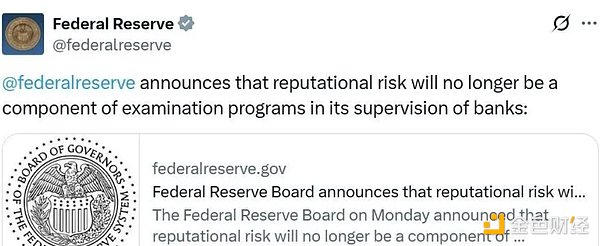Sudden change of direction: a key clause that was deleted
Three days ago, on June 24, Federal Reserve Chairman Powell suddenly announced that reputational risk would be removed from the bank regulatory assessment system. This adjustment, jointly promoted by more than 30 cryptocurrency companies that have been suppressed for many years and the American Bankers Association, a banking lobbying group, is actually a major shift in US financial regulation.

What is the "reputational risk" clause?
This clause stipulates that if a US bank engages in business that may cause negative public opinion (even if it is completely legal), it may face regulatory penalties. Reputation risk is used to unfairly target and deprive cryptocurrency companies of the right to use banks, becoming a "sword of justice" for banks to refuse to serve crypto companies, and also an important reason for the society to stigmatize the crypto industry.
For example, in 2023, a compliant crypto exchange was terminated by multiple banks due to "reputation risk". Many blockchain startups reported that 80% of financing negotiations failed because banks were worried about affecting their "reputation".
Reputation riskThis subjective, vague, sensory, and public opinion-oriented assessment has hindered the innovation and development of the US banking industry for a long time, especially in the adoption of new technologies. It has caused it to lag behind emerging countries such as Asia and the Middle East in many aspects.
Huge impact
1- Regulatory logic returns to its essence
The supervision of banks has shifted from "subjective judgment" to "objective standards". The old evaluation system relied on vague "social perception" evaluation, and the new system focuses more on quantifiable indicators such as capital adequacy ratio and liquidity.
2- Banks gain independent decision-making power
Banks will conduct business based on business logic rather than public opinion pressure, returning to normal and objective rationality.
For companies in the cryptocurrency industry, they can finally get basic banking services. For traditional banks, they can freely explore innovative financial cooperation and achieve a win-win situation.
Rob Nichols, president and CEO of the American Bankers Association, said in a statement:
"We have always believed that banks should be able to make business decisions based on prudent risk management and free markets rather than the personal views of regulators."
Within 24 hours of the policy announcement, JPMorgan Chase and many other banks immediately announced the restart of encryption-related service evaluations, which had been forced to be interrupted during the Biden administration.
3- Establish an innovation and inclusive orientation
This adjustment has eliminated the "biased regulation" of emerging technologies in the banking industry from an institutional perspective.
The early days of the Internet also faced similar doubts and concerns about reputational risks, but with the institutional relaxation, the Internet ushered in a glorious 30 years. The technological and economic achievements created in 30 years even exceeded the sum of human development in the previous 3,000 years.
This adjustment will not only reserve development space for the cryptocurrency industry, but also for innovative technologies such as AI. The development of new technologies cannot be separated from financial support. Banks and the financial industry cannot become obstacles and stumbling blocks to the development of science and technology, especially they cannot be swayed by subjective or even biased opinions and reputations.
4- May trigger a shift in global banking regulation
In order to align with the global financial "boss" the United States, it can be predicted that this adjustment will trigger a shift in banking regulation in many regions and countries around the world, such as:
1. The EU may follow up and adjust the MiCA regulatory rules
2. Emerging market countries accelerate encryption legislation and loosen bank-related businesses
3. The Bank for International Settlements (BIS) will revise global standards
This is not only the deletion of clauses, but also the evolution of regulatory thinking - from paternalistic control to market-oriented governance.
Let us wait and see.
5- Reconstructing the financial ecological landscape
For the encryption industry, it will have the following positive impacts:
• Broadening of financing channels: VC investment will be smoother
• Reducing operating costs: payment and settlement efficiency increased by 30%+
Four or five years ago, I saw that some American cryptocurrency companies needed to register companies in countries friendly to the encryption industry in order to invest in new projects, and then exchange large amounts of Bitcoin for stablecoins through special channels. The whole process was not only costly, but also caused the United States to lose a lot of high-tech talents and assets.
For the traditional financial industry, it will open up new businesses and enjoy the dividends brought by the high growth of the new technology industry:
• New product lines: incremental businesses such as custody and clearing
• Customer groups: attracting technology companies and young customers
Thinking
This adjustment of the Federal Reserve's bank supervision indicates that: American financial innovation no longer needs to pay for "social perception", and compliance development will become the only criterion.
 Anais
Anais





